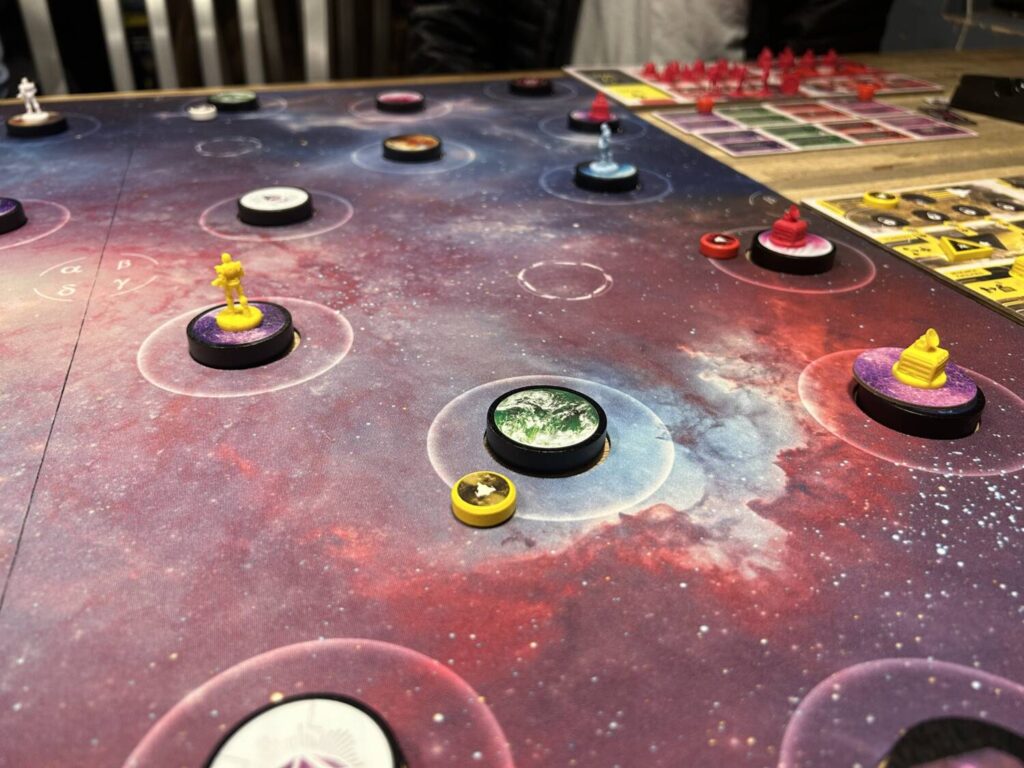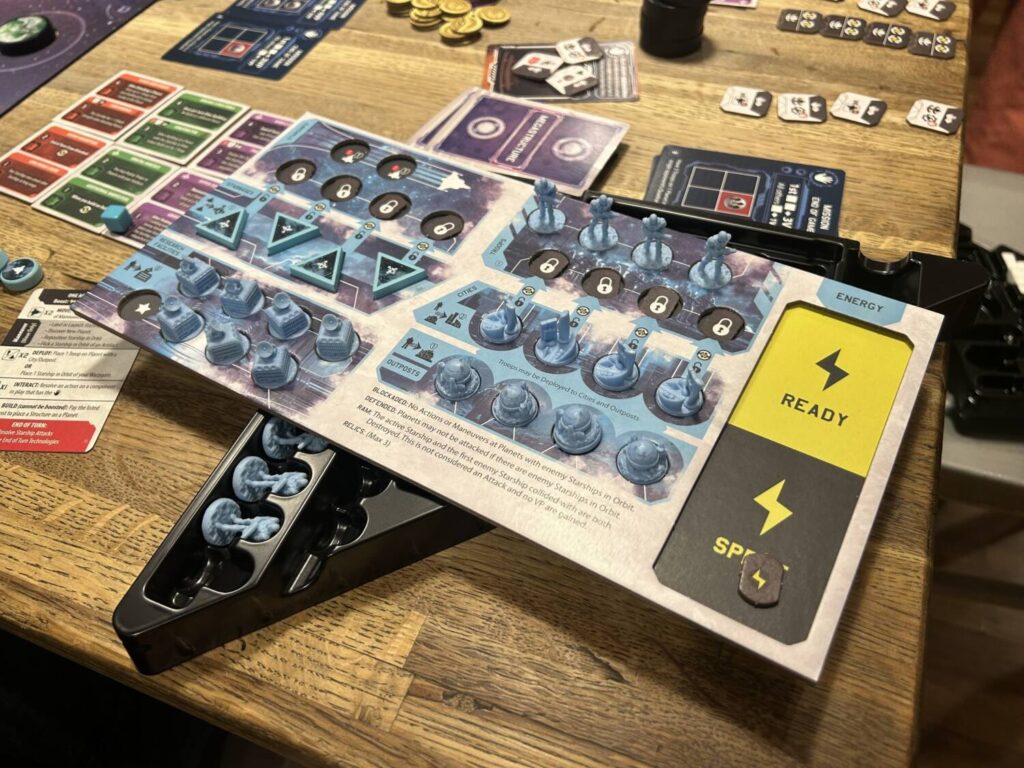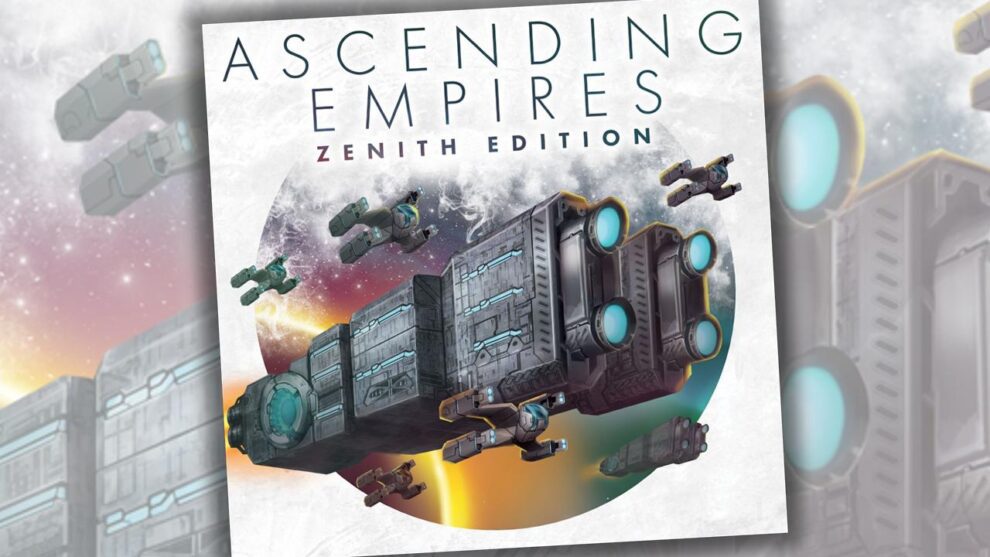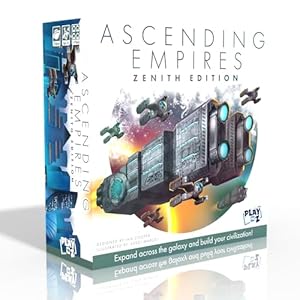Disclosure: Meeple Mountain received a free copy of this product in exchange for an honest, unbiased review. This review is not intended to be an endorsement.
A bit of a masterstroke, Ascending Empires. Conceptually bulletproof. The sort of idea that dares you not to play. “It’s a 4x game, but you flick your ships.” One of the most beautiful sentences I’ve ever heard, right up there with, “So we beat on, boats against the current, borne back ceaselessly into the past,” or “Dude, where’s my car?”
The trick with a design like this is to nail the fundamentals. It would be easy to get carried away, to allow the novelty of that one idea to compensate for an otherwise lacking execution, but I’m pleased as punch to say that Ascending Empires, without the flicking, would be a rock-solid 4x game. It wouldn’t necessarily be an exciting one, but it would work, and that’s what you need here.
 Let’s consider Ascending Empires less the movement mechanics, just to make sure I’m doing my due diligence. Over an hour or two, you explore, expand, exploit, and exterminate, one action at a time. The rules are clean, comfortably familiar without being uninspired. There are no resources in the traditional sense, no building materials needed or fuel to keep track of. The only resource you have is Power, which can be spent to perform a given action more than once in the same turn. If you want to place troops, and you meet the criteria, you can do it. If you attack an opposing ship and it’s in range, you succeed. It’s a beautiful, clean way to play.
Let’s consider Ascending Empires less the movement mechanics, just to make sure I’m doing my due diligence. Over an hour or two, you explore, expand, exploit, and exterminate, one action at a time. The rules are clean, comfortably familiar without being uninspired. There are no resources in the traditional sense, no building materials needed or fuel to keep track of. The only resource you have is Power, which can be spent to perform a given action more than once in the same turn. If you want to place troops, and you meet the criteria, you can do it. If you attack an opposing ship and it’s in range, you succeed. It’s a beautiful, clean way to play.
As you explore space, revealing and settling the planets that litter the board, you can build up military power, cities, and research stations. The research stations are my favorite non-dexterity element of Ascending Empires. There are four branches of technology, each with four levels to unlock. Every time you build a research station on a given planet, you unlock an additional level for the tech of the corresponding color. The planet types are evenly distributed around the board, one of each per quadrant. To expand your tech necessitates expanding your empire. It’s inspired. The best 4x games allow for some players to vent their aggression while others choose a more peaceful path, but turtling can lead to boring game states. The research stations keep everyone tuned in to the wider board. To hunker down in Ascending Empires is to die.
Flick!
So you take that bog standard 4x game and put it on neoprene, and you make the player ships discs, and you remove any ability to do deterministic movement, and you end up with a dang good time. To move in Ascending Empires, to boldly go where no player has gone before, you flick your ships from one point to another.
To attack someone, you have to be within a certain distance of their location. To colonize a planet, you have to be in orbit, denoted by an atmospheric corona surrounding each planet. To successfully do either requires finesse. If your ship hits an enemy ship mid-trip, both are removed. If you hit a planet, though, you’re alright. They are but bumpers in the pinball machine of life. The cruelest and most wonderful decision Play to Z made with the production here was choosing thick wooden discs for the planets. They’re set in Swiss cheese holes all over the board, so they aren’t going anywhere. Ships bounce right off ‘em. If you approach a planet too hot, you go flying off into space.
 Is this thematic? Maybe not. But it is, and I cannot stress this enough, funny. And there’s nothing quite like the satisfaction of a perfect bank shot, or judging the speed just right on approach. Introducing dexterity is a wonderful way to massage some entropy into the system without stripping players of a sense of control.
Is this thematic? Maybe not. But it is, and I cannot stress this enough, funny. And there’s nothing quite like the satisfaction of a perfect bank shot, or judging the speed just right on approach. Introducing dexterity is a wonderful way to massage some entropy into the system without stripping players of a sense of control.
Bef0re wrapping up, it is worth taking a moment to compliment the production of the Zenith Edition. Each player gets their own tray, loaded with all their components. Everything, the mats included, fits perfectly in the box. I am most struck by the efficacy of the production. This is a lot of game and a lot of product for the price. Play to Z managed it by making every component just as nice as it needed to be. I mean that as a huge compliment. Knowing when it’s alright for a token to be but a token is a skill not all publishers possess, and players pay for it.
Ascending Empires is fast, smooth, interactive, occasionally very mean, and, at all times, a whole lot of fun. It’s easy for games seeking some of those traits to lose sight of the last one.













Add Comment